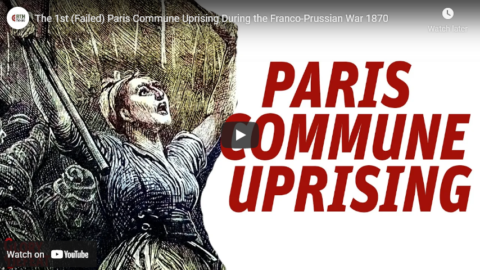On the morning of the 21st of December, 1989, Romanian General Secretary Nicolae Ceaușescu was in a foul mood. The Berlin Wall had fallen, and Mikhail Gorbachev and George H.W. Bush had recently announced the end of the Cold War, making the end of Ceaușescu’s rule inevitable, though he couldn’t see this yet. Worse, his security leaders had just failed to violently put down protests in the city of Timisoara, a fact that enraged his wife Elena.
“You should have fired on them, and had they fallen, you should have taken them and shoved them into a cellar,” she said. “Weren’t you told that?”
Long one of the world’s most vicious dictators, Ceaușescu’s most recent plan for winning over the heartland was forcing half the country’s villagers to destroy their own homes — with pick-axes and hammers, if they couldn’t afford a bulldozer — and packing them into project apartments in new “agro-industrial towns”, for a “better future”. Despite this, and his long history of murder, terror, and spying, Ceaușescu to the end did not grasp that his unpopularity had an organic character. He was convinced ethnically Hungarian “terrorists” were behind the latest trouble.
After reaching the balcony of Bucharest’s Central Committee building to give a speech that December day, he’s genuinely surprised when the crowd turns on him. When he tells them to be quiet, he’s befuddled by their refusal, saying, “What, you can’t hear?” Elena jumps in and yells, “Silence!”, to which Ceaușescu, hilariously, replies, “Shut up!” The crowd listens to neither of them.
Paul Kenyon’s Children of the Night describes the morbid black comedy that ensued. The Ceaușescus and a motley gang of undead apparatchiks that included the “morbidly obese Prime Minister, Emil Bobu” later tried to load into a single helicopter — Bobu “waddled, walrus-like, to the rear” Kenyon writes — but there were too many of them, and the copter barely got off the ground. “Where to?” asked the pilot, and nobody knew, because there was no plan, since none of them had ever considered the possibility of this happening.
The sky was full of stuff, including other helicopters, which were dropping leaflets on the crowd giving what Kenyon described as a Marie Antoinette-like order to ignore “imperialist conspiracies” and return home “to a Christmas feast”. Four days later, a firing squad put the Ceaușescus against a wall and gave them their final, solid lead Christmas presents.
Ceaușescu’s balcony will forever be a symbol of elite cluelessness. Even in the face of the gravest danger, a certain kind of ruler will never be able to see the last salvo coming, if doing so requires any self-examination. The neoliberal political establishment in most of the Western world, the subject of repeat populist revolts of rising intensity in recent years, seems to suffer from the same disability.
Matt Taibbi, “Justin Trudeau’s Ceausescu Moment”, TK News by Matt Taibi, 2022-02-10.
May 30, 2022
QotD: The end of Nicolae Ceaușescu
March 8, 2022
The Battle of Flamborough Head – Nice Ship, I’ll Take It
Drachinifel
Published 28 Aug 2019Today we look at John Paul Jones’ most famous battle, where the quality of not giving up no matter the odds shines through in a big way!
Want to support the channel? – https://www.patreon.com/Drachinifel
Want a shirt/mug/hoodie – https://shop.spreadshirt.com/drachini…
Want a medal? – https://www.etsy.com/uk/shop/Drachinifel
Want to talk about ships? https://discord.gg/TYu88mt
Want to get some books? www.amazon.co.uk/shop/drachinifel
Drydock Episodes in podcast format – https://soundcloud.com/user-21912004
March 5, 2022
Battle of Quebec | Animated History
The Armchair Historian
Published 10 Feb 2019Sources:
1775: A Good Year for Revolution, Kevin Phillips100 Decisive Battles: From Ancient Times to the Present, Paul K. Davis
Warfare In The Ninteenth Century, David Gates
Battles of The Revolutionary War 1775-1781, W.J. Wood
A Guide to the Battles of the American Revolution, Theodore P. Savas & J. David Dameron
Cracking the AP U. S. History Exam, 2018 Edition, Princeton Review
Music:
“Epic Battle Speech” by Wayne Jones
“Elegy” by Wayne Jones
“All This – Scoring Action” by Kevin MacLeod is licensed under a Creative Commons Attribution license (https://creativecommons.org/licenses/…)
Source: http://incompetech.com/music/royalty-…
Artist: http://incompetech.com/“Hero’s Theme” by Twin Musicom is licensed under a Creative Commons Attribution license (https://creativecommons.org/licenses/…)
Source: http://www.twinmusicom.org/song/280/h…
Artist: http://www.twinmusicom.org“And Awaken – Stings” by Kevin MacLeod is licensed under a Creative Commons Attribution license (https://creativecommons.org/licenses/…)
Source: http://incompetech.com/music/royalty-…
Artist: http://incompetech.com/“Big Horns Intro 2” by Audionautix is licensed under a Creative Commons Attribution license (https://creativecommons.org/licenses/…)
Artist: http://audionautix.com/“Faceoff” by Kevin MacLeod is licensed under a Creative Commons Attribution license (https://creativecommons.org/licenses/…)
Source: http://incompetech.com/music/royalty-…
Artist: http://incompetech.com/“Long Note Two” by Kevin MacLeod is licensed under a Creative Commons Attribution license (https://creativecommons.org/licenses/…)
Source: http://incompetech.com/music/royalty-…
Artist: http://incompetech.com/“Cortosis – Scoring Action” by Kevin MacLeod is licensed under a Creative Commons Attribution license (https://creativecommons.org/licenses/…)
Source: http://incompetech.com/music/royalty-…
Artist: http://incompetech.com/“Long Note Three” by Kevin MacLeod is licensed under a Creative Commons Attribution license (https://creativecommons.org/licenses/…)
Source: http://incompetech.com/music/royalty-…
Artist: http://incompetech.com/Victoria II. Copyright © 2018 Paradox Interactive AB. www.paradoxplaza.com
Antonio Salieri, “Twenty six variations on La Folia de Spagna”
London Mozart Players
Matthias Bamert, as conductor
February 4, 2022
November 27, 2021
Making a Medieval TART DE BRY (Brie Tart) | Brie: The King of Cheese
Tasting History with Max Miller
Published 28 Apr 2020This Tart de Bry, or Brie Tart, comes from The Forme of Cury and was served at the table of King Richard II (1367 – 1400). Its flavor is nearly as rich as the history of the cheese that goes into it, and in this episode I will explore both.
Help Support the Channel with Patreon: https://www.patreon.com/tastinghistory
Follow Tasting History with Max Miller:
Instagram: https://www.instagram.com/tastinghist…
Twitter: https://twitter.com/TastingHistory1Episodes mentioned in this video:
Medieval Cheesecake (for tart dough) – https://youtu.be/GCCJ2Qpr1nM
Medieval Cheese (for straining cheese) – https://youtu.be/vlQZ3NPnoLk
Rapé Fig Spread: https://youtu.be/_o7Oq-OjKu8LINK TO INGREDIENTS & TOOLS**
SAFFRON THREADS – https://amzn.to/2yTwoPS
PIE SHIELD – https://amzn.to/2YeTnjh
TART TIN – https://amzn.to/2yPbUrCLINK TO SOURCE:
The Forme of Cury: https://amzn.to/31frAAy**Amazon offers a small commission on products sold through their affiliate links, so each purchase made from this link, whether this product or another, will help to support this channel with no additional cost to you.
TART DE BRY
RECIPE (1390 – The Forme of Cury)
Take a crust ynch depe in a trape. Take yolkes of ayren rawe and chese ruayn and medle it and the yolkes together. And do thereto powdor gynger, sugar, safron and salt. Do it in a trape, bake it, and serve it forth.MODERN RECIPE (Based on Lorna J Sass’s adaptation from To The King’s Taste – https://amzn.to/3bNg2XE)
INGREDIENTS
– 1 pound of Brie cheese, the younger the better
– 6 egg yolks
– ⅛ tsp saffron (about 10 threads ground up)
– ¾ tsp light brown sugar or more if you want a sweeter tart.
– ⅜ teaspoon powdered ginger
– A pinch of salt
– A sprinkle of nutmeg or cinnamon (optional)METHOD
1. Preheat the oven to 425°F / 220°C.
2. Roll out your tart dough to about an ⅛ inch thick and line your tin. Add pie weights and set in the oven to blind bake for 10 minutes. Remove the crust and remove the pie weights. If the bottom of the crust is not fully cooked, return it to the oven without the weights for 5 minutes. Once out of the oven, press down the bottom of the crust if it has risen. Allow crust to cool completely and reduce the oven temperature to 350°F / 175°C.
3. Remove the rind from the brie saving some to the side. Then cut the brie into small pieces and place in a blender with the egg yolks. Blend together. Then add the saffron, brown sugar, ginger, and salt and blend to combine.
4. Place a bit of the rind on the bottom of the tart and add the cheese mixture and smooth the top. If you are using cinnamon or nutmeg, sprinkle a bit on top now.
5. Bake at 350°F / 175°C for 30 to 40 minutes or until the top is set and begins to brown. Serve warm or at room temperature.SOURCES
The Forme of Cury – By Samuel Pegge – https://amzn.to/3cXBycA
To The King’s Taste – Lorna J. Sass – https://amzn.to/3bNg2XE
The Course of History: 10 Meals that Changed the World – https://amzn.to/2yWuIoL
Brie Cheese History – https://www.thespruceeats.com/history…PHOTOS
Abbaye Notre-Dame-de-Jouarre – Fredlesles CC BY-SA (https://creativecommons.org/licenses/…)
By J. Chéreau – Musée de la Révolution française, CC BY-SA 4.0, https://commons.wikimedia.org/w/index…
A carriage underside has broken sending the occupants flying Wellcome / CC BY (https://creativecommons.org/licenses/…)
Blue Stilton – Coyau / Wikimedia Commons / CC BY-SA 3.0
Limberger Cheese – Original photo by John Sullivan
Gruyere – © Rolf Krahl / CC BY (https://creativecommons.org/licenses/…)
Stracchino – Cvezzoli / CC BY-SA (https://creativecommons.org/licenses/…)
Brie cheese with fresh thyme on black background – Marco Verch / CC BY-SA 2.0 (https://flickr.com/photos/160866001@N…)#brie #cheese #medieval #medievalfood #tastinghistory #medievalrecipes
November 11, 2021
H.G. Wells – The Outline of History – The Great War
Thersites the Historian
Published 5 Mar 2021In this video, we look at H.G. Wells’ coverage of World War I, from the war’s outbreak to the Armistice. Here, we see Wells at his most passionate and he makes a few controversial claims as well as sharing a couple of his personal experiences as a Londoner dealing with German air raids and celebrating the Armistice.
Patreon link: https://www.patreon.com/thersites
PayPal link: paypal.me/thersites
Discord: https://discord.gg/QCaXXFr
Brave Browser: https://brave.com/noa557
Twitter link: https://twitter.com/ThersitesAthens
Minds.com link: https://www.minds.com/ThersitestheHis…
Steemit/dtube link: https://steemit.com/@thersites/feed
BitChute: https://www.bitchute.com/channel/jbyg…
November 5, 2021
The 1st (Failed) Paris Commune Uprising During the Franco-Prussian War 1870
Real Time History
Published 4 Nov 2021Sign up for Curiosity Stream and get Nebula bundled in and SAVE 26%: https://curiositystream.com/realtimeh…
The Siege of Paris during the Franco-Prussian War 1870 and the downfall of the French Empire after the Battle of Sedan created a volatile social situation in the French capital. And in November 1870 this situation erupted in an attempt to topple the provisional government and create a self-ruling Paris Commune.
» THANK YOU TO OUR CO-PRODUCERS
John Ozment
James Darcangelo
Jacob Carter Landt
Thomas Brendan
James Giliberto
Kurt Gillies
Albert B. Knapp MD
Tobias Wildenblanck
Richard L Benkin
Scott Deederly
John Belland
Adam Smith
Taylor Allen
Jim F Barlow
Rustem Sharipov» OUR PODCAST
https://realtimehistory.net/podcast – interviews with historians and background info for the show.» LITERATURE
Arand, Tobias: 1870/71. Die Geschichte des Deutsch-Französischen Krieges erzählt in Einzelschicksalen. Hamburg 2018Gouttman, Alain: La grande défaite. Paris 2015
Spiekermann, Uwe: “Die wahre Geschichte der Erbswurst”, unter: https://uwe-spiekermann.com/2018/05/1… (zuletzt besucht am 21.9.2021)
» SOURCES
Chuquet, Arthur: La Guerre 1870-71. Paris 1895Fontane, Theodor: Der Krieg gegen Frankreich. Bd. 3. Berlin 1878
Goncourt, Edmond de: Journal des Goncourts. II.1. 1870-1871. Paris 1890
Hérisson, Maurice d’: Journal d’un officier d’ordonnance. Paris 1885
Heylli, Georges d’ (ed.): M. Thiers à Versailles: l’armistice. Paris 1871
Kürschner, Joseph (Hrsg.): Der große Krieg 1870-71 in Zeitberichten. Leipzig o.J. (1895)
Meisner, Heinrich Otto (Hrsg.): Kaiser Friedrich III. Das Kriegstagebuch von 1870/71. Leipzig 1926
N.N.: Bismarcks Briefe an seine Gattin aus dem Kriege 1870/71. Stuttgart, Berlin 1903
Schikorsky, Isa (Hrsg.): “Wenn doch dies Elend ein Ende hätte”. Ein Briefwechsel aus dem Deutsch-Französischen Krieg 1870/71. Köln, Weimar, Wien 1999
» OUR STORE
Website: https://realtimehistory.net»CREDITS
Presented by: Jesse Alexander
Written by: Cathérine Pfauth, Prof. Dr. Tobias Arand, Jesse Alexander
Director: Toni Steller & Florian Wittig
Director of Photography: Toni Steller
Sound: Above Zero
Editing: Toni Steller
Motion Design: Philipp Appelt
Mixing, Mastering & Sound Design: http://above-zero.com
Maps: Battlefield Design
Research by: Cathérine Pfauth, Prof. Dr. Tobias Arand
Fact checking: Cathérine Pfauth, Prof. Dr. Tobias ArandChannel Design: Battlefield Design
Contains licensed material by getty images
All rights reserved – Real Time History GmbH 2021
October 19, 2021
Sarah Hoyt on getting #teamheadsonpikes to trend
In the latest Libertarian Enterprise, Sarah Hoyt considers the people who are still desperately hoping that if they just vote harder, the next election will fix everything:
Normalcy bias is YUGE in America. It is a testament to the founders’ vision that after a century of attempts to wrench us away from a constitutional republic, after a massive, in the open election steal, people are still counting on elections to right this mess.
They’re right and wrong.
Look, I’m holding up my lighter with tears in my eyes, and whispering hopefully “Team heads on pikes”. Because I think a brief, brutal convulsion is our best hope to come back to ourselves as ourselves.
In the end we win, they lose, but the gradual road is in the end more costly. Perhaps the butcher’s bill will be hidden. You won’t see heads on pikes and bodies on overpasses. But the squid farms on Mars, the unborn babies, the uninvented conveniences, the–more costly. Because socialism kills, either fast or slow, and the longer we play footsy with it, the more lives will be lost. In that case, probably lives that don’t exist.
And frankly, though #teamheadsonpikes might not eventuate, I still see a brief and violent convulsion in our future. Understand “violent” here does not refer to the butcher’s bill. I mean, I wouldn’t want to be the Junta and their toadies, as I think there will be a few Romanian Christmas Gift events, but MOSTLY? MOSTLY there will be a lot of retirements, if we’re lucky a few prison sentences, almost for sure a lot of people taking themselves overseas for retirement (I’m hoping the Obama posse and their cronies are dumb enough to run to China. (Looks heavenward. Lord, if I’m a very good girl for the rest of my life …) our institutions will turn over so fast you’d think they were on wheels. They might retain the name but that will be the last resemblance. People will lose all faith in government (we’re mostly there) and this bizarre idea of scientific governance will be finally put to bed with a shovel. About 100 years after it should have been, but hey.
Why do I think that? Why do I expect an uprising at all? Americans are supine and taking it and reeeeeeeee.
Will someone PLEASE get me my eyes? The cats aren’t here, but the floor is covered in dust and paint chips. That can’t be good.
Two things: Normalcy bias. As I said, most people who aren’t political animals (Party like it’s 1776, yo) are still waiting for the elections to fix everything. Hell, I’ve seen people who are political animals waiting for it. And the left is lying to itself very hard and half believes their wins are legitimate. (AH!)
And: IF there is a rebellion and the news doesn’t report it, would you know about it?
Hell, the world has been in more or less open rebellion for 5 years, and our news sits on it, like it’s their favorite thumb. And most people don’t see it, except for things like Brexit, or Trump’s election. Ask them about German farmers driving their tractors to city hall and they’ll look at you like you’re nuts.
So now?
September 27, 2021
Why Were Things So Terrible In the 17th Century – General Crisis Theory
Kings and Generals
Published 26 Sep 2021
Go to https://NordVPN.com/kingsandgenerals and use code
kingsandgeneralsto get a 2-year plan with a huge discount plus 4 additional months for free. Protect yourself online today!Kings and Generals animated historical documentary series on early modern history and economic history continue with a video on the general crisis theory, as we try to deduce why the 17th century events were so terrible and why so many wars, rebellions, and upheavals happened in this period
Support us on Patreon: http://www.patreon.com/KingsandGenerals or Paypal: http://paypal.me/kingsandgenerals. We are grateful to our patrons and sponsors, who made this video possible: https://docs.google.com/document/d/1o…
The video was made by EdStudio while the script was researched and written by Turgut Gambar. Narration by Officially Devin (https://www.youtube.com/user/OfficiallyDevin)
Merch store ► teespring.com/stores/kingsandgenerals
Podcast ► http://www.kingsandgenerals.net/podcast/
Twitter ► https://twitter.com/KingsGenerals
Instagram ► http://www.instagram.com/Kings_Generals
Production Music courtesy of Epidemic Sound: http://www.epidemicsound.com
#Documentary #EarlyModern #GeneralCrisis
September 15, 2021
QotD: The cult of Napoleon
The worship of Napoleon has always been a French mystery. Is it spontaneous, reflecting nostalgia for empire, or something organized by the state, which has inherited from that period a matchless taste for authority? French schoolchildren are taught only the benefits of the emperor’s reign. According to our textbooks, Napoleon is supposed to have endowed France with a perfect legal system that still governs us today and to have caused the winds of freedom to blow across Europe. Each year, a dozen more books are published in France touting Napoleon’s glory. He has been represented more often than Christ on film, always as a positive hero.
Other Europeans see him very differently. While French historians amplify the myth that Napoleon himself created by dictating his idealized Memoires on St. Helena, English, German, Russian and Spanish authors count up the massacres and the destruction of their cities and their civilization.
Napoleon began shaping his reputation while he was still alive. He commonly wrote reports of his victories before the battles had even begun, which makes him the founding father of fake news. Certain disasters, such as the Battle of Eylau (now in Poland) against the Russians and Prussians, for example, are still inscribed in the walls of the Arc de Triomphe in Paris as if they were victories, since that is how they were first announced.
Since France is now part of Europe — rather than Europe becoming part of France, as Napoleon wished — what should we commemorate? French victories, such as Austerlitz, were defeats for the Russians and Austrians. Waterloo, a day of mourning for the French, is a symbol of liberation for the British, Germans, and Dutch. In any case, since the return of Napoleon’s ashes, our view of history has changed; the fate of people concerns us more than the fate of armies. Napoleon’s stature does not benefit from this change of perspective. To finance his wars, he ruined Europe, banning international commerce (only smugglers got rich), conscripting peasants, ravaging harvests, and confiscating horses. How should we commemorate the Russian and German campaigns of 1812 and 1813, when the Grand Army left in its wake not the liberation of peoples, but famine and epidemic? Worst still, how should we commemorate the restoration of slavery in the French Antilles, Guadeloupe, and Santo Domingo (Haiti), where the deputies of France’s Revolutionary Convention had abolished it in 1794?
Guy Sorman, “Which Napoleon?”, City Journal, 2021-05-14.
September 10, 2021
Why France Did Not Surrender After Sedan – Empress Eugénie Flees The Country I Franco-Prussian War
realtimehistory
Published 9 Sep 2021Sign up for a free 1 month trial for Skillshare: https://skl.sh/realtimehistory08211
After the French defeat at Sedan, the German states expect peace negotiations. But instead the new French republic declares an early form of “total war” and continues the fight. Meanwhile Empress Eugénie flees the country for Britain.
» THANK YOU TO OUR CO-PRODUCERS
John Ozment
James Darcangelo
Jacob Carter Landt
Thomas Brendan» OUR PODCAST
https://realtimehistory.net/podcast – interviews with historians and background info for the show.» LITERATURE
Arand, Tobias: 1870/71. Der Deutsch-Französische Krieg erzählt in Einzelschicksalen. Hamburg 2018
Arand, Tobias/Bunnenberg, Christian (Hrsg.): Karl Klein. Die Fröschweiler Chronik. Hamburg 2021
Herre, Franz: Eugénie. Kaiserin der Franzosen. München 2000
Howard, Michael: The Franco-Prussian War. London 1961
Milza, Pierre: L’année terrible. La guerre franco-prussienne. Septembre 1870 – mars 1871. Paris 2009» SOURCES
Braun, Lily (Hrsg.): Kriegsbriefe aus den Jahren 1870/71 von Hans v. Kretschman. Berlin 1911
Hérisson, Maurice Graf d’: Journal d’un officier d’ordonannce. Juillet 1870 – Février 1871. Paris 1885
Goncourt, Edmond de: Journal des Goncourt. Memoire de la vie litteraire. 2.1. 1870-1871. Paris 1890
Russell, William Howard: Meine sieben Kriege. Die ersten Reportagen von den Schlachtfeldern des 19. Jahrhunderts. Frankfurt a. M. 2000» OUR STORE
Website: https://realtimehistory.net»CREDITS
Presented by: Jesse Alexander
Written by: Cathérine Pfauth, Prof. Dr. Tobias Arand, Jesse Alexander
Director: Toni Steller & Florian Wittig
Director of Photography: Toni Steller
Sound: Above Zero
Editing: Toni Steller
Motion Design: Philipp Appelt
Mixing, Mastering & Sound Design: http://above-zero.com
Maps: Battlefield Design
Research by: Cathérine Pfauth, Prof. Dr. Tobias Arand
Fact checking: Cathérine Pfauth, Prof. Dr. Tobias ArandChannel Design: Battlefield Design
Contains licensed material by getty images
All rights reserved – Real Time History GmbH 2021
September 4, 2021
Battle of Sedan – German Victory and Fall of the French Empire (Franco-Prussian War)
realtimehistory
Published 2 Sep 2021The Battle of Sedan was one of the pivotal moments in the 19th century. The French 2nd Empire’s defeat at Sedan (and the capture of Emperor Napoleon III) unleashed social tensions in Paris and a new French republic was proclaimed. And while the victory of the German Armies was resounding, the cost at places like Bazeilles was also high.
» THANK YOU TO OUR CO-PRODUCERS
John Ozment
James Darcangelo
Jacob Carter Landt
Thomas Brendan» OUR PODCAST
https://realtimehistory.net/podcast – interviews with historians and background info for the show.» LITERATURE
Arand, Tobias: 1870/71. Die Geschichte des Deutsch-Französischen Krieges erzählt in Einzelschicksalen. Hamburg 2018Barry, Quintin: The Franco-Prussian War 1870-1871. Vol 1: the Campaign of Sedan. Solihull 2006
Bourguinat, Nicolas/Vogt, Gilles: La guerre franco-allemande de 1870. Une histoire globale. Paris 2020
Gouttman, Alain: La grande défaite de 1870-1871. Paris 2015
Howard, Michael: The Franco-Prussian War. London 1961
Herre, Franz: Eugénie. Kaiserin der Franzosen. Stuttgart, München 2000
Milza, Pierre: L’année terrible. Paris 2009
» SOURCES
Chuquet, Arthur. La Guerre 1870-71. Paris 1895Fontane, Theodor: Der Krieg gegen Frankreich. Bd. Berlin 1874
Kühnhauser, Florian: Kriegs-Erinnerungen eines Soldaten des königlich bayerischen Infanterie-Leib-Regiments. Patenkirchen 1898
N.N. (Hrsg.): Bismarcks Briefe an seine Gattin aus dem Kriege 1870-71. Stuttgart, Berlin 1903
Sheridan, Philip H.: Von Gravelotte nach Paris. Erinnerungen aus dem deutsch-französischen Kriege. Leipzig 1889
» OUR STORE
Website: https://realtimehistory.net»CREDITS
Presented by: Jesse Alexander
Written by: Cathérine Pfauth, Prof. Dr. Tobias Arand, Jesse Alexander
Director: Toni Steller & Florian Wittig
Director of Photography: Toni Steller
Sound: Above Zero
Editing: Toni Steller
Motion Design: Philipp Appelt
Mixing, Mastering & Sound Design: http://above-zero.com
Maps: Battlefield Design
Research by: Cathérine Pfauth, Prof. Dr. Tobias Arand
Fact checking: Cathérine Pfauth, Prof. Dr. Tobias ArandChannel Design: Battlefield Design
Contains licensed material by getty images
All rights reserved – Real Time History GmbH 2021
August 20, 2021
HMS Indefatigable – Guide 116 (Extended)
Drachinifel
Published 6 Apr 2019HMS Indefatigable, a razee frigate of the British Royal Navy, is today’s subject.
Want to support the channel? – https://www.patreon.com/Drachinifel
Want to talk about ships? https://discord.gg/TYu88mt
Want to get some books? www.amazon.co.uk/shop/drachinifel
August 5, 2021
Sarah Hoyt on “scientific government”
In the latest Libertarian Enterprise (which came out a few days ago, but I’ve been very busy), Sarah Hoyt outlines the genesis of the push for “scientific government” to save us all from ourselves and set right all the ills of the world:
Look, guys, since the middle of the 19th century, the idea of “scientific government” has been running around with pants on its head screaming insults at passerbys.
I like to say we’re still suffering from the consequences of WWI, but things were if not terminal very ill before then. Kings and emperors and Lord knows what else had got the idea of “science” and “permanent progress” stuck in their pin-like heads, which frankly couldn’t retain much more than the correct fork. And there were pet “scientists” and philosophers (the distinction was sometimes arguable. I mean, after all while doing experiments on electricity the 18th century was also fascinated with astral projection and other such things, and made no distinction. And the 19th was not much better.)
By the 20th century with mechanics and the Industrial Revolution paying a dividend in lives saved and prosperity created, these men of “science” were sure that it was only a matter of time till humanity and its reactions, thoughts and governance were similarly under control. And in the twentieth they expected us to become like unto angels.
Now, is there science that saved lives and created the wealthiest society every in the 20th century. DUH. Who the hell is arguing it. Oh, wait, there’s an entire cohort of people denying it. Not so many in the US — I think it’s hard to tell the real thing from foreign idiots posing. But in any case a minuscule contingent — but in France I know there’s a ton of them. They’re running with the bit in their teeth against rationality (I swear to bog) and thought and science. And trying to rebuild the religion of the middle ages. I read them and shake my head.
You see, you have to separate rationality and science from what the government and experts TELL you is rationality and science.
Yes, I know that France built a “Temple to Reason” and you know what? That by itself tells you their revolution was self-copulating and not right in the head. But you don’t need to go that far. Anyone who says they’re “for science” and want equality of results among disparate humans is not reasonable. Or reasoning. Or rational. They are however for sure completely and frackingly insane.
But I do understand the temptation, because so much of what’s being sold as “science” in the schools is not science but the worn out dogmas of people too stupid to know science if it bit them in the fleshy part of the buttocks.
I mean, never mind 2020. Which … you know? Remember how the flu vanished? Turns out the rat bastards were using a test that diagnosed flu as COVID. No, seriously. Malice or stupidity? I don’t know. And neither do you. Probably yes in most cases, though a lot of people have a ton of “learned stupidity”.
Even before 2020 a lot of our ideas on how things worked were lies, particularly those that hinged on or supported the leftist ideas of human kind. Things like Zimbardo’s (Is he dead yet? I need to know when to mark myself safe from being kidnapped by Zimbardo for crazy experiments. No, he really did that.) prisoner experiments; or the rat habitat experiments that supposedly showed that overpopulation had all sorts of bad effects, and therefore we should stop having kids. Turns out those effects are from the loss of social role. Which honestly, anyone who has looked at a conquered country could tell them. Of course, anyone who had looked at mice would also know they’re not humans, but never mind that. […] In fact, practically everything we think we know about psychology or sociology is likely to be a load of crap, if not outright faked.
And history, which is not really a science. Oh. Dear. Lord. Like, you know, the early form of internationalism, with international supply chains and empires caused WWI and … nationalism was blamed for it. Makes perfect sense … in hell.
In fact all this “science” stuff needs to be judged on one thing only: Does it make human lives better/save them? Or is it the astral projection of economics, sociology and psychology? By their fruits, etc.
















